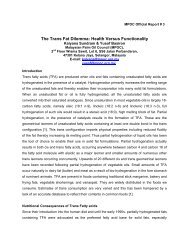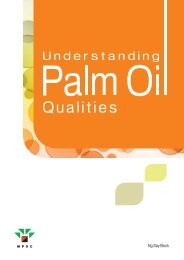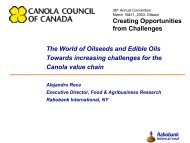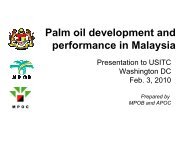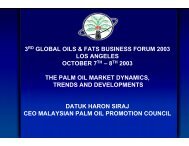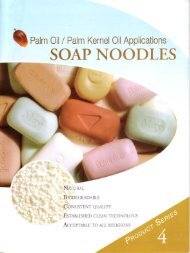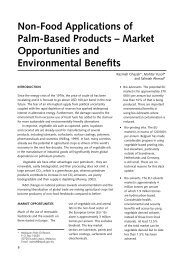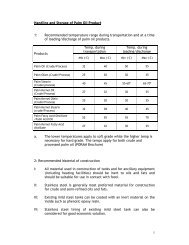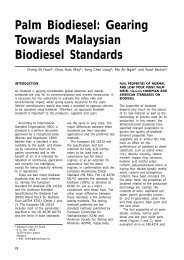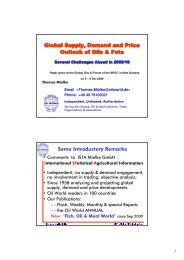You also want an ePaper? Increase the reach of your titles
YUMPU automatically turns print PDFs into web optimized ePapers that Google loves.
MarketsFocus on the vegetable oil sectorLong before the Indian Budget is announced at theend of February each year, people from all walks oflife would have drawn up a list of what they wouldlike to see included or, in some cases, not included in theproposals.The Finance Minister will once again walk the tight rope. His ownlist would include only one wish: that the majority of the peopleand the country benefit from his proposals.The paradox is that proposals for the benefit of one group couldbe perceived to adversely affect another. Concessions for theconsumer could adversely affect the producer. Incentives givento importers could affect domestic manufacturers.Vegetable oil is only one of many categories where differentpeople – the farmer, manufacturer, trader and importer – havedifferent wishes.ConsumersThis is the broadest group that is likely to be affected by everyaspect of the budget proposals. The last 24 months have seensignificant increases in the prices of most commodities andgoods. Vegetable oil, an essential commodity, has been noexception as prices have more than doubled.So, consumers can only wish that the budget proposals willalleviate their hardship. <strong>Oil</strong> consumption in India, at 11kg percapita, is well below the world average of 18kg.The consumerdoes not care much about the form in which the budgetproposals are worded, so long as these help bring downprices.Vegetable oil manufacturersA further reduction in import duties is what they want. Dutieson all vegetable oils, particularly palm-based products, have beenreduced significantly over the last 24 months. CPO import dutiesdropped from a staggering 80% to 45%, and duty on refinedpalm oil is at 52.5%. Duty on crude soybean oil has beenreduced from 45% to 40%.The industry will want import duties harmonised on all gradesof vegetable oils. CPO duty could be brought down to the levelof crude soybean oil, while refined palm oil and refined soybeanoil could be equalised at 45%. Rationalisation of labelling lawswould be another item on the wish-list.Vanaspati industryThe industry has been reeling under the impact of duty-freeimports under the Free Trade Agreements (FTAs) with SriLanka and Nepal, although quotas have been fixed. Not beingin a position to oppose the FTAs, the industry would bepleased to see a level playing field. It would want India to insistthat Sri Lanka and Nepal comply strictly with the rules oforigin under the FTAs.Especially in view of the high price of palm oil, budget proposalsto re-examine such compliance would make the industry’s day.Alternatively, the government could allow genuine vanaspatimanufacturers to import palm oil duty free – under strictenforcement to prevent misuse by others – to enable them tocompete with imports under the FTA.The sector would welcome a review of regulations on use ofpalm stearin in vanaspati manufacture. Besides cuttingproduction costs, this would benefit the palm oil processing36GLOBAL OILS & FATS BUSINESS MAGAZINE • VOL.5 ISSUE 1, 2008



